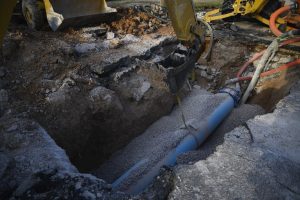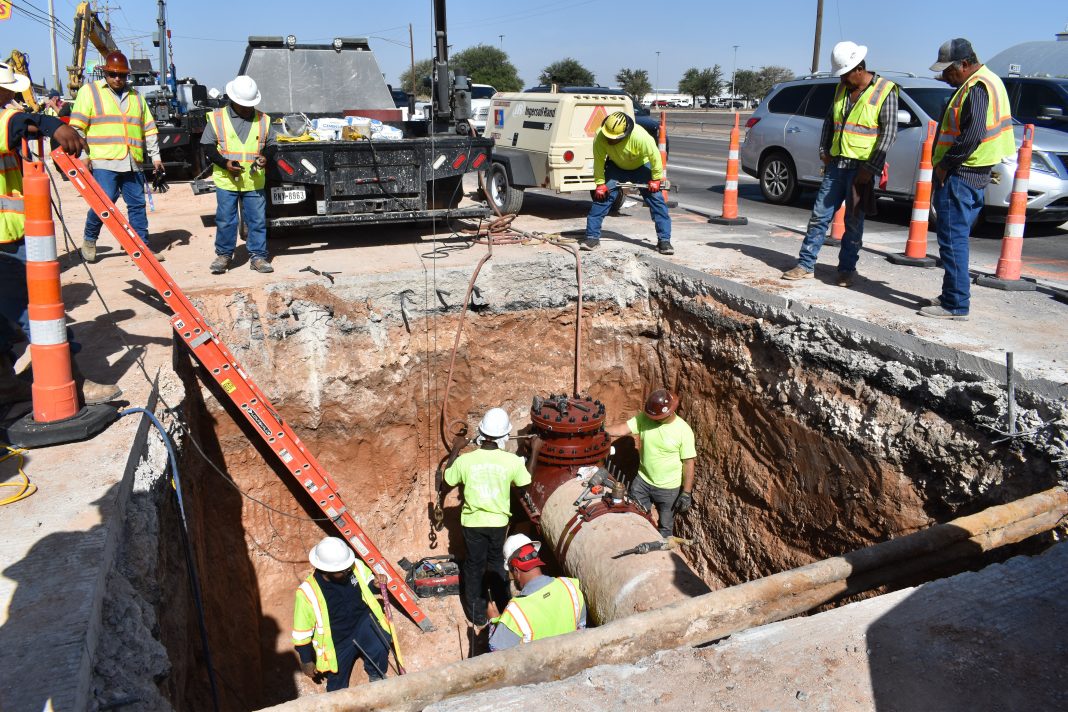It’s going to be awhile to figure out how much Monday’s broken waterline cost the City of Odessa and local businesses, but members of the city council, mayor and utility’s director are adamant any blame being cast on the city is entirely misplaced.
Last year, the American Society of Civil Engineers gave the United States a C- grade when it comes to drinking water and a D+ in wastewater systems. According to the engineers, the majority of the nation’s two million miles of underground pipes are rapidly deteriorating.
Tom Kerr, utilities director for the City of Odessa, said the 24-inch waterline that broke Monday and caused the loss of 10-15 million gallons of water, was more than 60 years old and made of cast iron.
The average life expectancy of waterlines is 50-70 years, but often depends upon the amount of corrosive minerals in the water, the type of soil surrounding them and what the pipes themselves are made of, Kerr said.
Unfortunately, Kerr said, 40 percent of Odessa’s pipes are made of cast iron and another 20% are made up of other iron-based materials and unfortunately both types are prone to erode and develop calcium build up, Kerr said.
To make matters worse, many of Odessa’s pipes are located near oil field pipelines and the materials that make those pipelines “actually rob the minerals out of our steel, so our pipes will corrode,” Kerr said.

MASTER PLAN
Under the city’s Master Plan, Kerr and his crew are systemically replacing the older pipes with those made of PVC, fiberglass or high density polyethylene, but it is a long and costly process, he said.
In fact, it might be more than 100 years before all of the pipes are replaced since the city has more than 500 miles of pipe, some as big around as 48-inches, Kerr said. The city also has thousands of valves that also need to be replaced.
A priority list has been developed to replace the lines based on the number of breaks each has had, but the list often changes depending upon where the most recent breaks occur and how critical the line is, he said.
Lines 12-inches or larger are transmission lines, Kerr said.
“Say I had two breaks on a 24-inch line, that may precipitate and be more important than six breaks on a 12 or an 18,” Kerr said.
Some waterlines are also given a priority if a road project is planned, he said. No one wants to tear up a brand new road to get to a broken waterline.
The council approved a Crane Avenue waterline project Tuesday night because of an upcoming road project, Kerr said. The existing waterline dates back to 1949.
The city is also at a disadvantage when it comes to predicting what lines might break first, Kerr said.
While they have cameras designed to check out the water sewer system, it does not have the cameras necessary to do the same with the water lines, Kerr said. Moreover, even if it did, their use would necessitate taking 500-plus lines down one-by-one which would be too costly and time-consuming, he said.
“Besides, you can put a lot of effort into doing that and the priority may still end up being over here,” Kerr said.

WATER PLANT
In August 2021, the Odessa City Council agreed to pay $95 million to rehabilitate the city’s water treatment plant using certificates of obligation, but Kerr said it was never a matter of choosing the plant over the city’s aging pipelines.
The city had already created a master plan to address the pipes when city staff began exploring the possibility of implementing a reverse osmosis system, Kerr said. Once they began looking at the plant more closely, they discovered many troubling things.
Concrete walls were crumbling, the electrical system had serious issues due to the corrosive chemicals used to treat the water and the plants’ filters, although performing their job adequately, weren’t up to current design standards, Kerr said.
“The treatment plant, one if it’s not working, you don’t even need pipes, right?” Kerr said. “So the treatment plant is 1, a very high priority and 2, the condition of it was of such a nature that we just felt it was very, very important that we address it.”
Mayor Javier Joven said Tuesday morning he has always considered the water treatment plant and waterlines a top priority.
“This is why I always said that we need to get back to the basics of business, what the city does. Let’s get out of all the other little things that we do, the real estate business, the entertainment business. Let’s get back to what we’re supposed to be doing and that is providing reliable sources of water, safety and health to our community,” Joven said. “Keeping up our infrastructure is very critical and it should always have been priority one. We need to get back to the basics. I’ve already spoken with the city manager and we will make the important repairs and identify what other things need to be done.”
The city is expecting to receive roughly $10 million soon as a result of the American Rescue Plan Act and Joven said the council intends to discuss possibly using some of that money for the aging water lines. He had hoped to use ARPA money to pay down the debt for the water plant, but said he was overruled by the rest of the council.

COUNCIL REACTIONS
District 2 Councilmember Steve Thompson disagrees with Joven in that he believes the city must spend a certain amount of money on what he calls “quality of life” items.
“If you want to keep growing and you want to keep people, you want to have a good quality of life,” Thompson said.
However, Thompson is on board with the idea of spending ARPA money on waterlines.
“I’ve told everybody I’m for not giving that to anybody, we need to use that for ourselves and what we need to get done and if it’s for another main water line, we ought to be looking at that,” Thompson said.
District 1 Councilmember Mark Matta agrees Odessa’s infrastructure should be priority one.
“You know, it’s not as glamorous to spend money on infrastructure because it’s not seen, but it’s definitely felt in times like this,” Matta said. “I guess my take on it is we get petitions, we get programs, we get presentations from a whole bunch of programs who are asking for money. Some deserve that money and need that money and we do our best to try to make everybody happy and content with what we can give them. But, you know, we have to make sure that first and foremost, especially as a councilman for my district, I want to make sure that the constituents of District 1 and all of the City of Odessa is able to wake up, wash their face, brush their teeth, use the restroom, wash their clothes and have water to use.”
As far as people’s opinions, Matta said it’s impossible to make everyone happy.
“What’s been done in the past or what was brought up in the past is not important. What’s important is how we’re addressing this issue right now and how we’re moving forward. You know, everybody’s gonna have an opinion on what should have been done in the past or whatnot. You know, there’s no way to ever be 100% right on the decisions that are made all the time,” Matta said.

If the decision had been made to address the pipes before the plant and the plant went down, the city would face criticism then, too, Matta said.
“Facebook is a great tool for people to vent and let out their frustrations…and that’s their prerogative. They can say that. All we can do is fix the situation, fix problems that arise and hopefully we can fix it to the point where it won’t happen again.”
District 5 Councilmember Mari Willis agreed with Matta.
“The thing is, I live in a very old district so I know that the water pipes in my district are probably very old. Of course I’d like to say ‘This is an old district. Let’s get it done. This is inevitable. It’s gonna happen,’ but I also know that our water treatment plant (is in bad shape),” Willis said. “We could have put the water treatment plant aside and it went down, you know, and then the question would be, ‘Should have waited on the lines?’ So it’s just a balancing act and not any of us can predict what’s gonna be the next best thing to do.”
As other city officials have consistently said this week, Willis said what has happened is due to an aging system.
“It’s absolutely not incompetence or neglect. It’s just a matter of, we’re an old city, and our infrastructure is old and we’ve got to work on it. We’ve got to fix it,” Willis said. “At some point, you’ve got to prioritize. You think you’re doing the best, you’re making the best decision you can with the information that you have. We don’t have a crystal ball with the info. It would be nice to know what’s gonna break next, what’s going to happen next, but we just don’t.”
District 3 Councilmember Detra White also bemoaned the fact the city just doesn’t have the money to address all of its issues, but noted it is not alone.
“We can’t just do it all at once,” White said of fixing the water system. “Not only financially, but because of the disruptions it would cause in terms of traffic and utility flows.”
A waterline fix here and there is manageable, but fixing a downed water plant wouldn’t be a 24-48 hour operation, she also noted.
“I think the city is doing a good job,” when it comes to addressing its waterline issues, White said. “We’ve been focused on it many years.”

District 4 Councilmember Tom Sprawls said he also wants people to understand that there are rules about co-mingling city funds. The city’s water department is fully funded by those fees collected through water bills, while the city’s parks and recreation department is funded by a portion of people’s property taxes and one can’t take money from the other.
In his opinion, the utilities department is doing a good job keeping up with the necessary repairs given the funding it has, Sprawls said. The council has known for years about the issues within the water system and so were not surprised about Monday’s event.
The fact is, every city department has its wants and needs and not all can be met, he said.
“When Miss Willis, Miss White and I were brought onto the council…they presented us with a Christmas list, if you will, about the needs of the city and it was staggering,” Sprawls said. “We saw, after several weeks, how many millions of dollars that we needed that we don’t have to do what each department wanted to do.”
If the ARPA money can legally be spent on the waterlines, Sprawls said he’d vote in favor of doing so.
Councilmember at-large Denise Swanner takes umbrage about some of the comments being made about the city on Facebook. The incident this week was not a matter of incompetence, she said.
“People are going to post whatever on Facebook and there are elections coming up in November. You know elections always play a factor in this and, you know, that is unfortunate because nobody did this on purpose. It wasn’t intentional. Obviously it’s affecting the whole city, not just one district,” Swanner said.
She’s keeping her mind open about spending ARPA money on the waterlines, she said.
“I mean, we’ll have to see the presentations. See how it’s presented. Obviously I will want to put it towards the city’s needs first, but you know, you have all sorts of agencies that come out of the woodwork thinking that they need the money more, but our city needs them,” she said.

PRAISE GIVEN
Kerr, Joven and all of the councilmembers had nothing but praise for the 25 or so crew members who worked tirelessly throughout the week to fix the problem. Many worked more than 36 hours straight starting Monday night and in temperatures of 100 degrees or more.
“All of them are tremendous. I couldn’t believe how long they continued to work as they did. I mean, you get fatigued and the fact that they could still take that wrench and work it well and do those things is tremendous,” Kerr said. “They just kept plugging, you know, at times you make two steps forward and all of a sudden you fall back a step and they just keep plugging…I’m very proud of them. I’m very, very lucky to have them.”
“Let me just tell you that today, I will live nowhere else but Odessa. It tears me up to think about the crews who are out there,” Willis said Wednesday. “When you see guys who are waist to chest deep in water and you don’t know what type of water they’re in. They’ve been away from their families. They’ve had to keep their stamina. They’ve had to just endure. My hat is absolutely off to the crews, you know, who have been working away from their families, their families who don’t have water either.”



